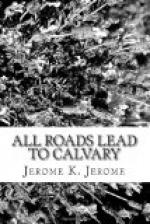Beauty. That was the key to the riddle. All Nature: its golden sunsets and its silvery dawns; the glory of piled-up clouds, the mystery of moonlit glades; its rivers winding through the meadows; the calling of its restless seas; the tender witchery of Spring; the blazonry of autumn woods; its purple moors and the wonder of its silent mountains; its cobwebs glittering with a thousand jewels; the pageantry of starry nights. Form, colour, music! The feathered choristers of bush and brake raising their matin and their evensong, the whispering of the leaves, the singing of the waters, the voices of the winds. Beauty and grace in every living thing, but man. The leaping of the hares, the grouping of cattle, the flight of swallows, the dainty loveliness of insects’ wings, the glossy skin of horses rising and falling to the play of mighty muscles. Was it not seeking to make plain to us that God’s language was beauty. Man must learn beauty that he may understand God.
She saw the London of the future. Not the vision popular just then: a soaring whirl of machinery in motion, of moving pavements and flying omnibuses; of screaming gramophones and standardized “homes”: a city where Electricity was King and man its soulless slave. But a city of peace, of restful spaces, of leisured men and women; a city of fine streets and pleasant houses, where each could live his own life, learning freedom, individuality; a city of noble schools; of workshops that should be worthy of labour, filled with light and air; smoke and filth driven from the land: science, no longer bound to commercialism, having discovered cleaner forces; a city of gay playgrounds where children should learn laughter; of leafy walks where the creatures of the wood and field should be as welcome guests helping to teach sympathy and kindliness: a city of music, of colour, of gladness. Beauty worshipped as religion; ugliness banished as a sin: no ugly slums, no ugly cruelty, no slatternly women and brutalized men, no ugly, sobbing children; no ugly vice flaunting in every highway its insult to humanity: a city clad in beauty as with a living garment where God should walk with man.
She had reached a neighbourhood of narrow, crowded streets. The women were mostly without hats; and swarthy men, rolling cigarettes, lounged against doorways. The place had a quaint foreign flavour. Tiny cafes, filled with smoke and noise, and clean, inviting restaurants abounded. She was feeling hungry, and, choosing one the door of which stood open, revealing white tablecloths and a pleasant air of cheerfulness, she entered. It was late and the tables were crowded. Only at one, in a far corner, could she detect a vacant place, opposite to a slight, pretty-looking girl very quietly dressed. She made her way across and the girl, anticipating her request, welcomed her with a smile. They ate for a while in silence, divided only by the narrow table, their heads, when they leant forward, almost touching. Joan noticed the short, white hands, the fragrance of some delicate scent. There was something odd about her. She seemed to be unnecessarily conscious of being alone. Suddenly she spoke.




